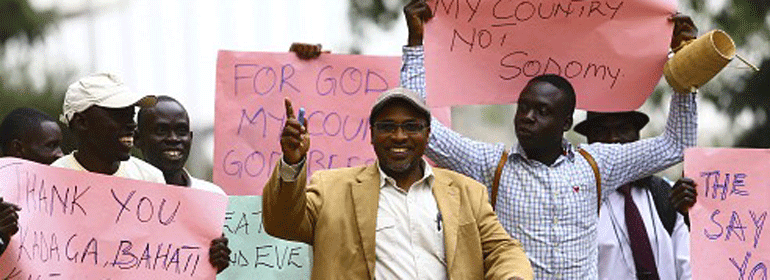Africa’s almost uniformly anti-gay atmosphere is a complex and troubled construct, almost entirely of the West’s making, says David Wilkins.
Africa is not a good place to be gay in 2014. Indeed, in the early stages of the 21st century Africa is in fact, an extremely dangerous place to be gay – or more importantly, to be found out, or to come out, or to be identified as being gay. Out of 54 countries on the continent of Africa, 38 now criminalise homosexuality.
Many African states have bizarrely straight borders. In colonial times, these lines were almost arbitrarily drawn, as the continent was divided up among Western powers. As Africa was carved up, thousands of years of tribal culture were ploughed into the desert. Ancient animosities were stored up over decades until, after the Europeans left, festering tribal hatreds erupted. The late 20th century saw bloody conflicts across the continent, a scourge that continues today. So on a continent full of deeply suspicious in-fighting, where has the nearly blanket hatred of LGBT people come from?
There is evidence to suggest that in ancient Africa, many cultures, while not quite celebrating homosexuality, were tolerant of it. But as the Western European powers divided up the continent, Victorian and pathologically Christian moralities were imposed with an iron fist upon the ‘savages’. For many modern African nations, the statutes that criminalised homosexual acts in the 19th century still exist today. (Bear in mind that when Ireland decriminalised homosexuality in 1993, the Acts of Parliament we committed to history had been imposed by the British in 1861 and 1885.)
From that time, well into the 20th century there was also a sharp upswing in Christian proselytisation in Africa. In 1900 there were nine million Christians; by the year 2000, there were an estimated 380 million. European missionaries essentially swapped souls for food and education, and the practice has in recent years been taken up by American style evangelicals, whose fervent brand of Christianity is equally, if not more homophobic. The other great religion in Africa, of course, is Islam. But depending on your take on the Koran, the attitude towards homosexuality is no more forgiving. Indeed, Sharia law demands the death penalty for homosexual acts.
The other great trauma that effectively emasculated the African male was the slave trade. Hundreds of thousands of men women and children were sold as chattels and treated as livestock. A deep-rooted hatred of and animosity toward the ‘white man’ percolated into the African, and indeed African-American, psyche, and is still part of society today. In recent years, many of Africa’s current political leaders have castigated Western politicians pronouncements on human rights, including gay rights. As Uganda’s President Museveni finally signed the hateful new bill into law, he told President Obama and Secretary John Kerry to keep their unwanted noses out of Ugandan affairs. They can manage just fine without them.
As the West’s thinking on morality and sexuality became more liberal over the past 50 years, Africa was busy freeing itself from the yoke of its former masters, looking for it’s own identity. Many African’s regard the West with a mixture of envy and resentment. Their view is that the West is largely responsible for the perilous state of many of the African nations’ economies and infrastructures. Recent political leaders are implying the West has some nerve lecturing others on morality, after its record in Africa over the last 200 years.
In recent history, the current African hatred of homosexuality has been largely of the West’s own making. But what, if any, responsibility does that impose on the West to protect those who fear persecution and even death for being gay in Africa? Many recent comments on social media sites against Uganda’s actions have been incredibly reactionary and in some cases rascist and xenophobic. There have been calls for a blanket ban of Western aid to African states that impose such harsh legislation on their own populations. However, I believe that will achieve nothing only to stiffen Africa’s resolve to go its own way.
The West bears a responsibility to articulate a more global, United Nations-based view that those attitudes towards homosexuality, along with women’s issues, slavery and the treatment of children belong in the past. They reflect the norms and mores of a time and a civilisation that no longer exist. We in the West need to try and differentiate between those elements of African society and culture we have no part in interfering with, and those darker elements of modern Africa that must be managed and dispatched to history if African nations are to become fully fledged members of a peaceful and tolerant global community.
Our approach must be one of sensitivity, understanding and empathy, coloured with respect for tolerance. There is nothing to fear about difference and everything to gain from inclusivity.
 David Wilkins is an experienced marketing professional with a keen interest in human rights, history, movies, cooking and writing indignant letters to The Irish Times. He lives with his longtime partner and their three dogs in Bray, Co. Wicklow. Currently unemployed, David thinks it might be a lovely gesture if someone gave him a job.
David Wilkins is an experienced marketing professional with a keen interest in human rights, history, movies, cooking and writing indignant letters to The Irish Times. He lives with his longtime partner and their three dogs in Bray, Co. Wicklow. Currently unemployed, David thinks it might be a lovely gesture if someone gave him a job.
© 2014 GCN (Gay Community News). All rights reserved.
